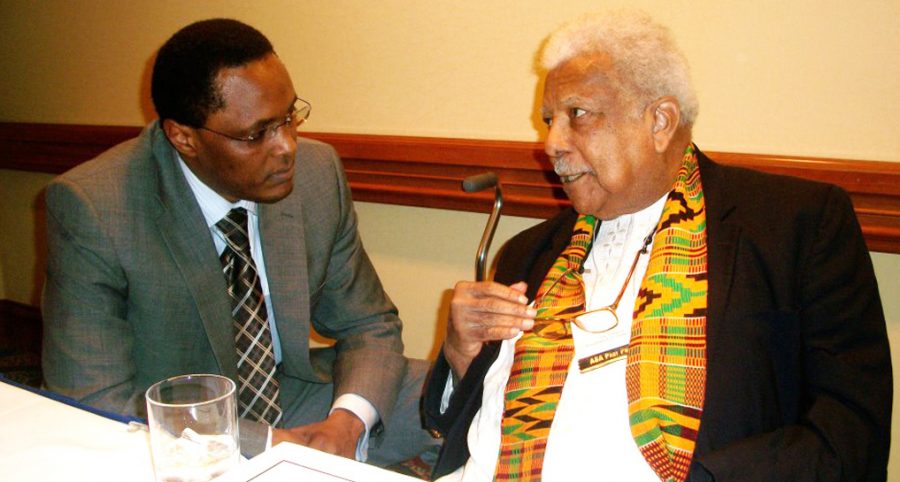May 7, 2014
by Allyson Karnowski
After years of researching, filming, editing and producing, Professor Ndirangu “David” Wachanga’s documentary is being recognized around the world.
In 2008, Wachanga embarked on creating his first documentary titled “Ali Mazrui: A Walking Triple Heritage,” which would take six years to finish and be only one part of his ongoing research.
“I am looking at using this project as a way of preserving East African memory, by capturing real voices,” Wachanga said.
While completing his dissertation on clandestine, or underground, media in Africa at the University of North Texas, Wachanga met the challenge of searching for hidden, restricted information.
He became interested in what citizens were left with after data from a country’s past was lost or destroyed: a suppressed memory. With documents gone, Wachanga relied on personal testimonies to understand a region’s history.
Wachanga, an information scientist, was able to gather facts about East Africa from those who personally lived through it, beginning with 81-year-old Mazrui.
“He is considered one of the most important intellectuals of his generation from that part of Africa,” Wachanga said.
Mazrui, who described his life as “one big debate,” engages in global, intellectual debates that have been publicly covered in the news for years.
Now a scholar and professor currently teaching at Binghamton University in New York, Mazrui has written more than 40 books and recently celebrated 50 years of academic contributions.
With the help of UW-Whitewater, students and other professors, Wachanga was able to complete the 84-minute documentary on Mazrui in six years while also teaching and in the process of tenure.
Throughout his time teaching Media Ethics, Wachanga has edited a book, published several articles in academic journals and newspapers, interviewed at BBC and traveled around the world screening his documentary.
Professor and Director of UWW-TV Jim Mead understands the commitment a project of this size takes, having done an applied project himself.
“You really have to be inspired by that topic to be able to spend that much time on it, and he was really committed,” Mead said.
Wachanga and Mead worked to find the best field equipment for the documentary as well as any technical troubleshooting fixes and edits. New software was purchased for use on Wachanga’s documentary that will now be used by students and professors
“This was an important project for him,” Mead said. “I admire him and hope he has great success.”
Along the way, the documentary became important for other contributors and influences, such as students. UW-W graduate Alisha Bade spent a year and a half of her college life editing and assisting Wachanga.
“His work becomes pretty inclusive,” Bade said, recalling starting the project as a graduate assistant and staying on even after leaving the official position.
Bade is one of many who put time and effort into this project. Students did much of the editing, among other activities like filming.
Allowing students to practice their skills was a part of the learning process during the documentary, but exposing them to a new aspect of Africa was one of Wachanga’s goals for students.
Wachanga said he strived to get viewers’ mindsets out of the stereotypical thoughts on this foreign continent that Wachanga describes as “not a single story, but complex with challenges, failures and also stories of triumph and success.” Personally having a hand in this project, Bade was able to look back at how it changed her.
“Prior to coming into it, I didn’t have any knowledge in that area of Africa, but working with [Wachanga], it’s become relevant to me,” Bade said.
Students are not the only ones who have been impacted by Wachanga’s determination and completed documentary. Melinda Levin, director of the Master of Fine Arts program at University of North Texas, said she has been inspired on both a professional and personal level.
“He is one of the most dedicated filmmakers and profoundly committed academic scholars I have met in my many years as a professor and filmmaker myself,” Levin said of her former Documentary Production and Theory student.
After Wachanga joined the University of North Texas as a faculty member, Levin also advised and gave input to the progressing documentary.
Levin recognizes not only how well it was produced, but the vitality of sharing East African culture as it reveals “a critically important time period, history and personality.”
“Ali Mazrui: A Triple Heritage” has been screened around the globe at Princeton, Yale, Cornell, Rutgers, Universitat Abat Oliba (Barcelona) and Wits University (South Africa) with plans for several more viewings this fall.
The film has been suggested for the Smithsonian Institute’s Folklife Festival in June, although the Kenyan ambassador has not yet confirmed that it will be shown. The 10-day festival will highlight Kenyan food, art, song and culture in Washington, D.C.
The next screening will take place at UW-Madison from 3 to 5 on May 8 at Ingraham Hall, hosted by the African Studies Program.


